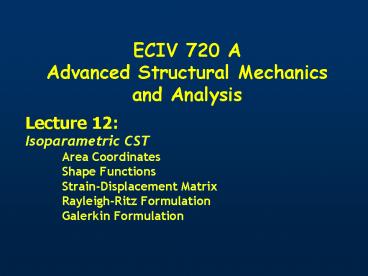ECIV 720 A Advanced Structural Mechanics and Analysis
1 / 84
Title:
ECIV 720 A Advanced Structural Mechanics and Analysis
Description:
ECIV 720 A Advanced Structural Mechanics and Analysis Lecture 12: Isoparametric CST Area Coordinates Shape Functions Strain-Displacement Matrix Rayleigh-Ritz Formulation –
Number of Views:234
Avg rating:3.0/5.0
Title: ECIV 720 A Advanced Structural Mechanics and Analysis
1
ECIV 720 A Advanced Structural Mechanics and
Analysis
- Lecture 12
- Isoparametric CST
- Area Coordinates
- Shape Functions
- Strain-Displacement Matrix
- Rayleigh-Ritz Formulation
- Galerkin Formulation
2
FEM Solution Area Triangulation
Area is Discretized into Triangular Shapes
3
FEM Solution Area Triangulation
One Source of Approximation
4
FEM Solution Nodes and Elements
Points where corners of triangles meet Define
NODES
5
Non-Acceptable Triangulation
Nodes should be defined on corners of ALL
adjacent triangles
6
FEM Solution Nodes and Elements
7
FEM Solution Objective
- Use Finite Elements to Compute Approximate
Solution At Nodes
- Interpolate u and v at any point from Nodal
values q1,q2,q6
8
Intrinsic Coordinate System
2 (0,1)
3 (0,0)
1 (1,0)
Parent
9
Area Coordinates
Location of P can be defined uniquely
Area Coordinates
10
Area Coordinates and Shape Functions
Area Coordinates are linear functions of x and h
Are equal to 1 at nodes they correspond to
Are equal to 0 at all other nodes
Natural Choice for Shape Functions
11
Shape Functions
12
Geometry from Nodal Values
13
Intrinsic Coordinate System
14
Displacement Field from Nodal Values
15
Strain Tensor from Nodal Values of Displacements
Need Derivatives
Strain Tensor
u and v functions of x and h
16
Jacobian of Transformation
J
Jacobian of Transformation
J
17
Jacobian of Transformation Physical Significance
18
Jacobian of Transformation Physical Significance
19
Jacobian of Transformation Physical Significance
20
Jacobian of Transformation
21
Strain Tensor from Nodal Values of Displacements
22
Strain Tensor from Nodal Values of Displacements
23
Strain Tensor from Nodal Values of Displacements
e B q
Looks Familiar?
24
Strain-Displacement Matrix
Is constant within each element - CST
25
Stresses
e B q
26
Element Stiffness Matrix ke
e B q
s D B qe
ke
27
Formulation of Stiffness Equations
t
Assume Plane Stress
28
Total Potential Approach
Total Potential
29
Total Potential Approach
30
Total Potential Approach
31
Total Potential Approach
Work Potential of Body Forces
32
WP of Body Forces
33
WP of Body Forces
34
WP of Body Forces
35
WP of Body Forces
36
Total Potential Approach
Work Potential of Tractions
37
WP of Traction
Distributed Load acting on EDGE of element
38
WP of Traction
39
WP of Traction
Components
40
WP of Traction
41
WP of Traction
2
3
1
42
WP of Traction
43
Total Potential Approach
Work Potential of Concentrated Loads
44
WP of Concentrated Loads
Indicates that at location of point loads a node
must be defined
45
In Summary
46
After Superposition
Minimizing wrt Q
47
Galerkin Approach
Galerkin
48
Galerkin Approach
49
Galerkin Approach
Introduce Virtual Displacement Field f
50
Galerkin Approach
51
Element Stiffness Matrix ke
52
Galerkin Approach
Virtual Work Potential of Body Forces
53
dWP of Body Forces
As we have already seen
54
dWP of Body Forces
55
Galerkin Approach
Virtual Work Potential of Traction
56
dWP of Traction
57
dWP of Traction
58
Galerkin Approach
Virtual Work Potential of Point Loads
59
dWP of Concentrated Loads
Indicates that at location of point loads a node
must be defined
60
In Summary
61
After Superposition
Y is arbitrary and thus
62
Stress Calculations
ee Be qe
63
Stress Calculations
Constant
64
Summary of Procedure
Tt (force/length)
Nodes should be placed at
65
Summary of Procedure
For Every Element Compute
- Strain-Displacement Matrix B
66
Summary of Procedure
67
Summary of Procedure
- Node Equivalent Traction Vector
For ALL loaded sides
68
Summary of Procedure
Collect ALL Point Loads in Nodal Load Vector
69
Summary of Procedure
Form Stiffness Equations
70
Summary of Procedure
Apply Boundary Conditions
For Every Element Compute Stress
71
Example
Tt200 lb/in
(0,2)
(3,2)
fx0
fy60 lb/in2
(0,0)
(3,0)
72
ANSYS Solution Coarse Mesh
73
(No Transcript)
74
(No Transcript)
75
(No Transcript)
76
(No Transcript)
77
(No Transcript)
78
(No Transcript)
79
(No Transcript)
80
2-D Constant Stress Triangle
Comments
- First Element for Stress Analysis
- Does not work very well
- When in Bending under-predicts displacements
- Slow convergence for fine mesh
- For in plane strain conditions Mesh Locks
- No Deformations
81
Element Defects
82
Element Defects
Constant Stress Triangles
Y-Deflection X-Stress about ¼ of actual
83
Element Defects
x10, y10 x2a, y20 x30, y3a
?
Spurious Shear Strain Absorbs Energy Larger
Force Required
84
Element Defects
Rubber Like Material n0.5
Mesh Lock































